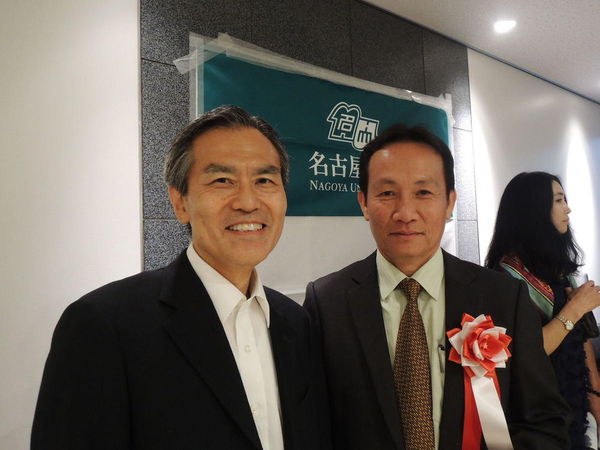At the end of September, three students graduated with doctorate degrees after completing the Transnational Doctoral Programs for Leading Professionals in Asian Countries, which is offered by Nagoya University's Asian Satellite Campuses Institute (ASCI). The program was set up to enable potential future leaders of Asian countries to study for a doctorate while working. It was certainly hard work, say all three, to do their research in the evenings after work and on weekends, but they successfully completed their doctorate theses after three years thanks to the ample support and guidance provided through video conferencing and other means of communication.
Two of the three new graduates - Tsend Tsogt, a judge at the Administrative Court of Appeals in Ulaanbaatar, Mongolia, who also teaches at university, and Nguyen Hoai Son, a legal counsel for the Vietnamese Ministry of Planning and Investment - studied law, while the third, Ngin Chhay, who works at the Ministry of Agriculture, Forestry and Fisheries of Cambodia, studied agriculture. They each had a master's degree already and were keen to continue their studies, but putting their career on hold to do so was not an option for them. The Program, which allowed them to work towards a doctorate without leaving their jobs, was a godsend. They received regular supervision through their local satellite campuses connected to Meidai. They also received support through intensive lecture sessions held at Meidai and from faculty members visiting their area. All tuition was in English.
The three new doctorate holders say they are already putting their research outcomes to practical use at work. This new leadership program may only be a small step, but it has taken a giant leap towards the future.

Ngin Chhay from Cambodia (Right) completed his PhD under the supervision of Professor Kazuhito Kawakita
Running such a program in Asia obviously helps the local efforts to develop homegrown talents, but according to Professor Kazuhito Kawakita, the Dean of Graduate School of Agricultural Sciences, it is also hugely valuable to the school. While agriculture is inherently rooted to its locality and has different regional characteristics, it also has many common issues that transcend borders, be it avian influenza and other zoonotic or amphixenotic diseases, crop pests and diseases, or climate change actions. Agriculture by nature has local and international aspects. For the future development of agricultural studies, it is essential that research activities take place across Asia in a variety of different forms.
In the case of bird flu, for example, Cambodia is said to be an uninfected area with no reported cases, but the reality is that the country has no experts to research this claim. "There must be many research subjects waiting to be unearthed", says Kawakita, "and it would be worthwhile both for local researchers and us to produce and publish scientific papers together."......>read more on the Meidai Watch
 |
Atsuko Tsuji: Earned B.A. in Arts, College of Arts and Sciences, the University of Tokyo in 1976. Joined The Asahi Shimbun Company in 1979 as a journalist and wrote many articles in science and technology area for newspaper and magazines published by the company including editorial pieces. Knight Science Journalism Fellow at Massachusetts Institute of Technology in 1989 and Reuters Fellow at University of Oxford in 2014. Designated Professor of Nagoya University's Institute of International Education and Exchange since October 2016.
|